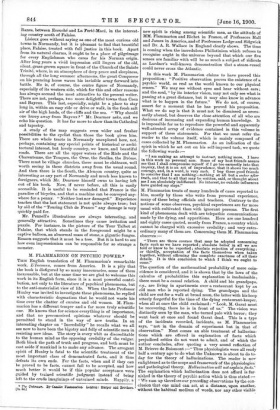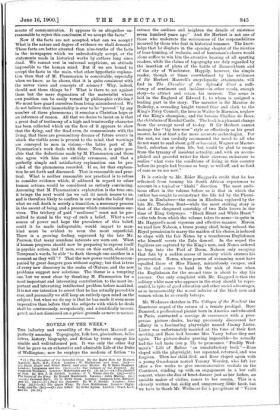M. FLAM.MARION ON PSYCHIC POWER.*
Tins English translation of M. Flammaaion's remarkable work, L' Inconnu, comes from America. It is a pity that the book is disfigured by so many inaccuracies, some of them inexcusable, but at the same time we are glad to welcome this work in its English form, since it is a most powerful contri- bution, not only to the literature of psychical phenomena, but to the anti-materialist view of life. When the late Professor Huxley was invited to investigate these phenomena, he replied with characteristic dogmatism that he would not waste his time over the chatter of curates and old women. M. Flam- marion has a different temper and a far more truly scientific one. He knows that for science everything is of importance, and that no preconceived opinions whatever should be permitted to stand in the way of new truths. In an interesting chapter on " Incredulity " he recalls what we all see now to have been the bigotry and folly of scientific men in resisting new ideas. The story is every whit as discreditable to the human mind as the opposing credulity of the vulgar. Both block the path of truth and progress, and both must be cast aside if mankind is to make any advance. The arrogant spirit of Huxley is fatal to the scientific treatment of the most important class of demonstrated facts, and it thus defeats its own ends. For the facts, when and if they can be proved to be facts, cannot fail to be accepted, and how much better it would be if this popular acceptance were guided by trained scientific judgment instead of being left to the crude imaginings of untrained minds. Happily, a sy CsaWeFlaminarlaa. Leaden: llama sad &other& • The Unix*" Us. iscL] new spirit is rising among scientific men, as the attitude of MM. Flammarion and Richet in France, of Professors Hall and James in America, and of Professors Lodge and Sidgwick
and Dr. A. R. Wallace in England clearly shows. The time is coming when the incredulous Philistinism which refuses to recognise aught in the universe beyond that which our five senses are fain iliar with will be as much a subject of ridicule
as Lardner's well-known demonstration that a steam-vessel could never cross the Atlantic.
In this work M. Flammarion claims to have proved this proposition : "Positive observation proves the existence of a psychic world, as real as the world known to our physical senses." We may see without eyes and hear without ears; and the soul, "by its interior vision, may not only see what is passing at a great distance, but it may also know in advance what is to happen in the future." We do not, of course, assert for a moment that he has proved his proposition. What we do say is that it must not be dismissed as neces- sarily absurd, but deserves the close attention of all who are desirous of increasing and expanding human knowledge. It is impossible for us to reproduce the powerful and apparently well-attested array of evidence contained in this volume in support of these statements. For that we must refer the reader to the volume itself, which is mainly composed of
cases collected by M. Flammarion. As an indication of the spirit in which he set out on his self-imposed task, we quote
the following words :—
" I am making an attempt to instruct, nothing more. I have in this work no personal aim. Some of my bast friends assure me that I shall compromise myself if I go too earnestly into that inquiry, that it is an act of imprudence, that it shows too much courage, and, in a word, is very rash. I beg these good friends to consider that I am nothing—nothing at all but a seeker after truth, and that to all that may be written, said, or thought about me I am absolutely indifferent. No interest,no outside influences have guided my steps."
M. Flammarion treats of many hundreds of cases reported to him, mostly by those who write from personal experience,
many of these being officials and teachers. Contrary to the notions of some observers, psychical experiences are far more usual with cultivated than with ignorant persons. The first kind of phenomena dealt with are telepathic communications made by the dying, and apparitions. Here are one hundred and eighty cases quoted, mostly from France, a country which cannot be charged with excessive credulity; and very extra- ordinary many of them are. Concerning them M. Flammarion observes :—
" There are three courses that may be adopted concerning facts such as we have reported ; absolute belief in all we are told or know to be reported ; absolute rejection of everything ; or thirdly, acceptation of the facts themselves when taken together, without affirming the complete exactness of all their details. It is this conclusion to which I think we ought to come."
The question of the mathematical probability of mere coin- cidence is considered, and it is shown that by the laws of the calculus of probabilities this explanation is inadmissible ;
there must be a causal relation. A child and his grandpapa, e.g., are living in apartments over a restaurant kept by an
old man who is reported dying. The grandpapa and the child are out for a walk at broad noon, the latter with his hoop utterly forgetful for the time of the dying restaurant-keeper, when all at once the child exclaimed : "Look, M. Garat must be recovering, there he is in front of us." The vision was distinctly seen by the man, who turned pale with terror; they went back at once and found G-arat dead. This is a type of the incidents recorded, incidents, as M. Flammarion says, "not in the domain of experiment but in that of observation." Next comes an able treatment of hallucina- tions which are offered in explanation of facts which prejudiced critics do not want to admit, and of which the author concludes, after quoting a very sound reflection of M. Brierre de Boismont :—" Thus physiologists were all ready half a century ago to do what the Unknown is about to do to. day for the theory of hallucinations. The reader is now
enlightened as to the scope and framework of the physiologic& and pathological theory. Hallucination will not explain. facts."
The explanation which hallucination does not afford is fur. addled in the theory of psychic action which is thus stated :— " We sum up therefore our preceding observations by the con.
elusion that one mind can act, at a distance, upon another, without the habitual medium of words, nor any other visible means of communication. It appears lio us altogether un- reasonable to reject this conclusion if we accept the facts."
Now if the facts are not accepted, what can we accept P What is the nature and degree of evidence we shall demand ? These facts are better attested than nine-tenths of the facts in the newspapers which we unhesitatingly accept, or the statements made in historical works by authors long since dead. We cannot rest in universal scepticism, an attitude impossible to the human mind. But if we are bound to accept the facts in the main, what other hypothetic explana- tion than that of M. Flammarion is conceivable, especially when we know, as he shows, that it is quite consistent with the newer views and concepts of science ? Why, indeed, should not these things be ? What is there to set against them but the mere dogmatism of the materialist whose own position can. be easily turned by philosophic criticism ? We must here guard ourselves from being misunderstood. We do not believe that immortality is ever to be " proved " by any number of these phenomena; it remains a Christian hope or an inference of reason. All that we desire to insist on is that a great deal of testimony of a high and trustworthy character has been collected which on the face of it appears to show that the dying, and the dead even, do communicate with the living, that there are premonitory dreams of future events in which the visible scene is present to the mind, that warnings are conveyed to men in visions,—the latter part of M. Flammarion's work deals with these. Now, it is quite pos- sible that the deductions made by M. Flammarion and those who agree with him are entirely erroneous, and that a perfectly simple and satisfactory explanation can be pro- vided of the phenomena recorded. If so, let that explana- tion be set forth and discussed. That is reasonable and prac- tical. What is neither reasonable nor practical is to refuse to consider evidence which, if adduced in regard to other human actions, would be considered as entirely convincing. Assuming that M. Flammarion's explanation is the true one, it brings the next world (as we call it) much nearer to us, and is therefore likely to confirm in our minds the belief that what we call death is merely a transition, a necessary process in the ascent of being, and a process which consciousness sur- vives. The trickery of paid " mediums " must not be per- mitted to stand in the way. of such a belief. What a new source of power and hope the prevalence of this belief, could it be made indisputable, would impart to man- kind must be evident to even the most superficial. There is a growing feeling, expressed by the late Mr. Pearson, that many mundane interests are worn out. What if human progress should now be preparing to express itself in psychic action, and if men, even on this earth, should, in Tennyson's words, be able "to flash through one another in a moment as they will" ? That the new power would be accom- panied by great dangers goes without saying; but that is true of every- new discovery in the realm of 'Nature, and the new problems suggest new solutions. The theme is a tempting one,'but we must close by thanking M. Flammarion for a most important and interesting contribution to the most im- portant and interesting intellectual problem before mankind. It is not our intention to assert that he has actually proved his case, and personally we still keep an entirely open mind on the subject; but what we do say is that he has made it even more imperative than before that the subjects with which he deals shall be continuously, scrupulously, and scientifically investi- gated, and not dismissed on a priori grounds as mere nonsense.







































 Previous page
Previous page